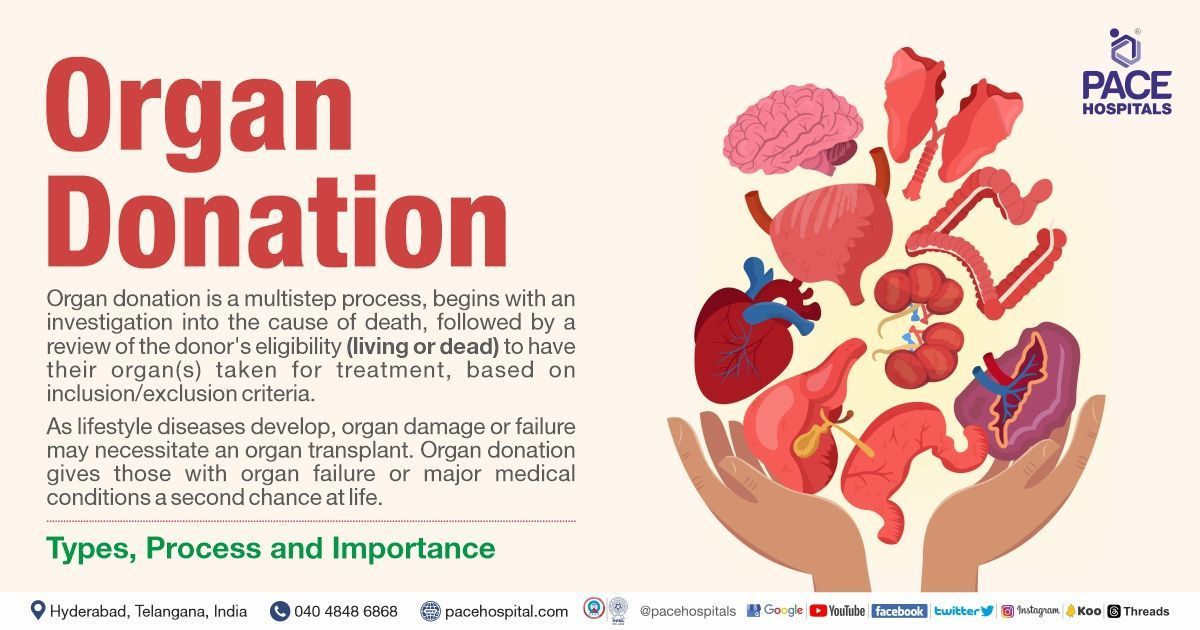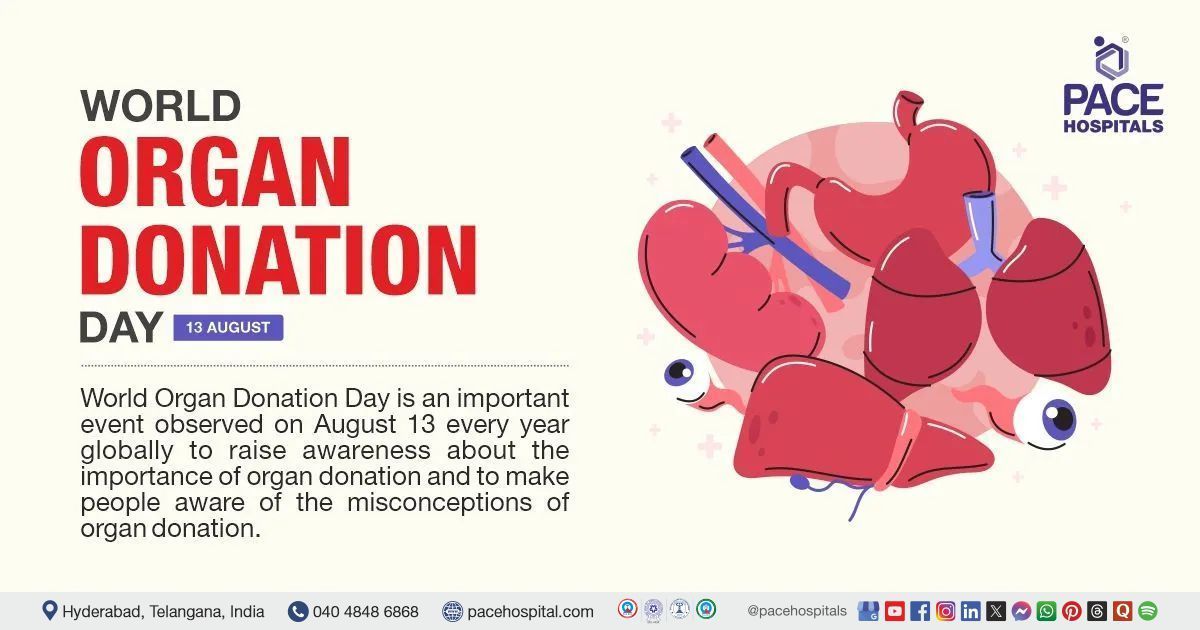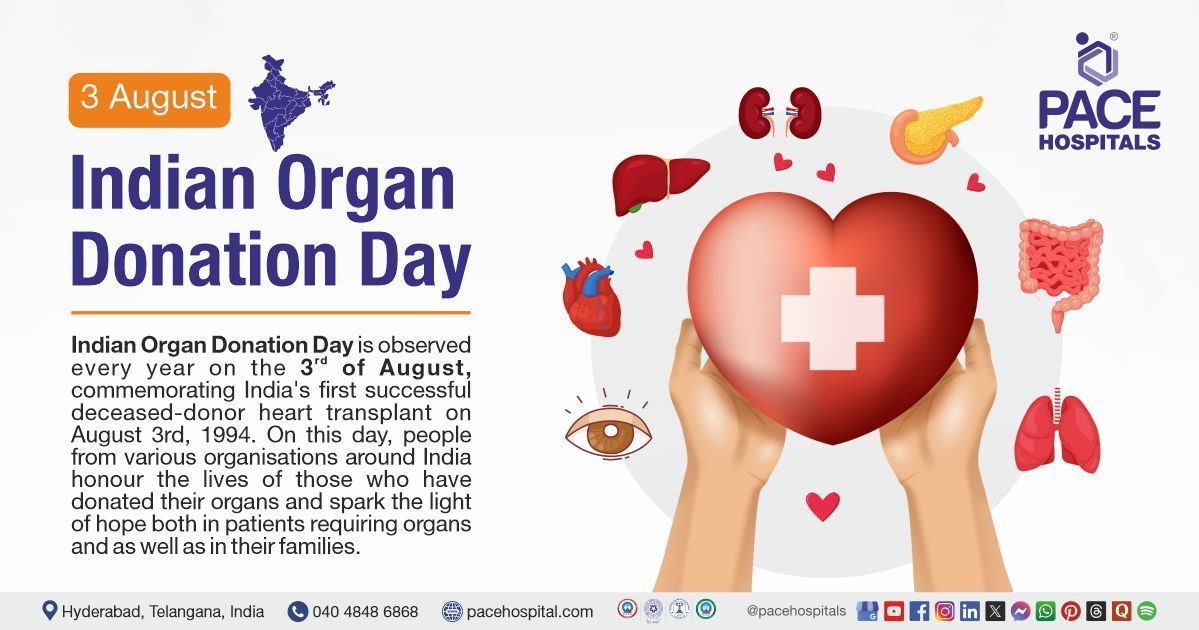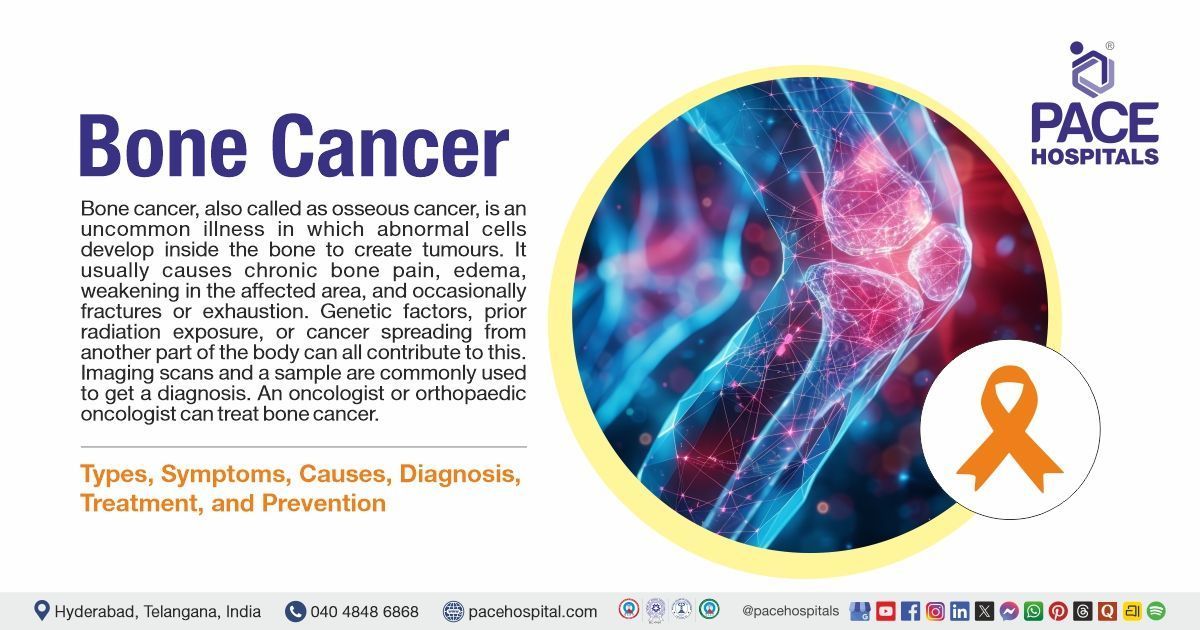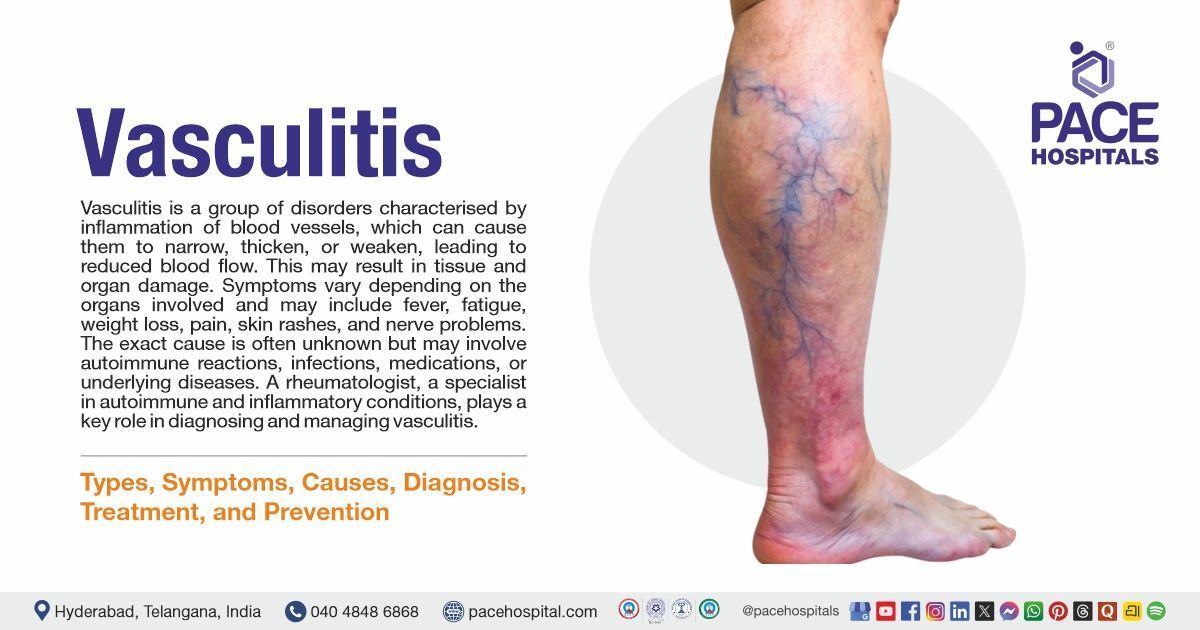Organ Donation - Types, Process, Registration & Importance
PACE Hospitals
Organ donation definition
Organ donation is a multistep process that initiates with an overall investigation into the cause of death, followed by an evaluation of the donor's eligibility (living or dead) to have their organ(s) harvested based on a set of inclusion/exclusion criteria only for the purpose of treatment. As there is a persistent increase in the prevalence of lifestyle diseases, resulting in organ damage or failure, one might require an organ transplant for their survival. The indication of organ donation is to provide a second chance of life for someone who is suffering from organ failure or a serious medical condition that has led to the malfunction or loss of a vital organ.
Organ donation is a multistep process, begins with an investigation into the cause of death, followed by a review of the donor's eligibility (living or dead) to have their organ(s) taken for treatment, based on inclusion/exclusion criteria. As lifestyle diseases develop, organ damage or failure may necessitate an organ transplant. Organ donation gives those with organ failure or major medical conditions a second chance at life.
Organ donation in India
Organs can be procured from a living or deceased donor. While few expendable organs, such as the kidneys, lungs, etc., can be donated from a living donor (as the donor can sustain life with the other corresponding organ), few selective organs can be harvested from a brain death patient if the procured organs are stored under standard guidelines.
The liver presents an interesting case as despite being one single unit, a part of the part of the liver can be donated for a liver transplantation on a living condition as the donor can sustain with the remaining part of the organ. Clinical brain death is evidence of irreversible cessation of brain, respiratory, and circulatory functions.
In India, the removal, storage, and transplantation of human organs are carried out as per the Transplantation of Human Organs & Act (THOA) 1994, which controls the legality of organ transplants. In 2011 the act was amended and named as Transplantation of Human Organs & Tissues Act (THOTA).
The government of India has launched National Organ Transplant Program to facilitate an effective system for procuring and distributing organs and tissues from deceased donors. This program creates a bridge that connects a network of central and state-level transplant organisations with tissue banks and transplant hospitals, thereby maintaining a national registry of organ & tissue donors and recipients.
Organ donation time limit after death
The organ donation time limit after death varies based on the type of organ procured. When a patient has been pronounced brain-dead or medically dead, in order to donate organs, the cadaver (dead patient) will be placed on artificial life support (ALS). The patient will stay on ALS until all the appropriate steps or necessary authorisations have been completed to retrieve the organs. The deceased person's organs could continue functioning for 36 to 72 hours after death with the provision of supportive measures such as ventilation, intravenous fluids and oxygen.
The longer it takes to remove the organs from the body, the less usable they will be. As a result, it's important to move promptly to complete procedures like family counselling, obtaining necessary approvals, etc. Once the organs have been removed, they must be transplanted as quickly as possible.
However, the following are the timelines that need to maintain to have a transplant based on the organ donated.
- Kidneys: up to half an hour
- Heart & Lungs: 4 - 6 hours
- Intestine: 6 hours
- Pancreas: 6 hours
- Liver: 6–12 hours
Types of organ donation
Based on the donor's live status, they are two types
- Living donors
- Cadaver donors (Non-living)
Living donors
These are the ones who are in relation to the recipient or the ones who donate out of affection and be a part of a noble cause with the approval of the authorisation committee. Based on the specification of tissue or organ recipients, the living donors are further divided into two types
- Directed donation: The donor names a specific tissue or organ recipient.
- Non-directed donation: The donor does not name a specific tissue or organ recipient
Cadaver donors (Non-living)
These are, in general, brain-dead victims or road accident victims where the patient will have a dead brain stem and cannot breathe; however, their heart and other organs can be functional with the aid of a ventilator, intravenous fluids and oxygen.
Based on the death of the brain or cardiac (heart), the cadaver donors are of two types, namely:
- Brain deceased donor
- Cardiac deceased donor
As per the Transplantation of Human Organs & Tissues Act, 37 different organs and tissues can be donated from a brain-deceased donor, whereas there are limitations for cardiac deceased donors as only a few organs, such as skin, bone, cornea and blood vessels, can be donated.
The age limit for organ donation in India is based on the donor type, as the cadaver or deceased donor can donate organs without any age barrier, whereas the living donor (near relative or other) needs to have more than 18 years of age. However, in young children (< 18 years), the consent of their parents is mandatory for organ donation.
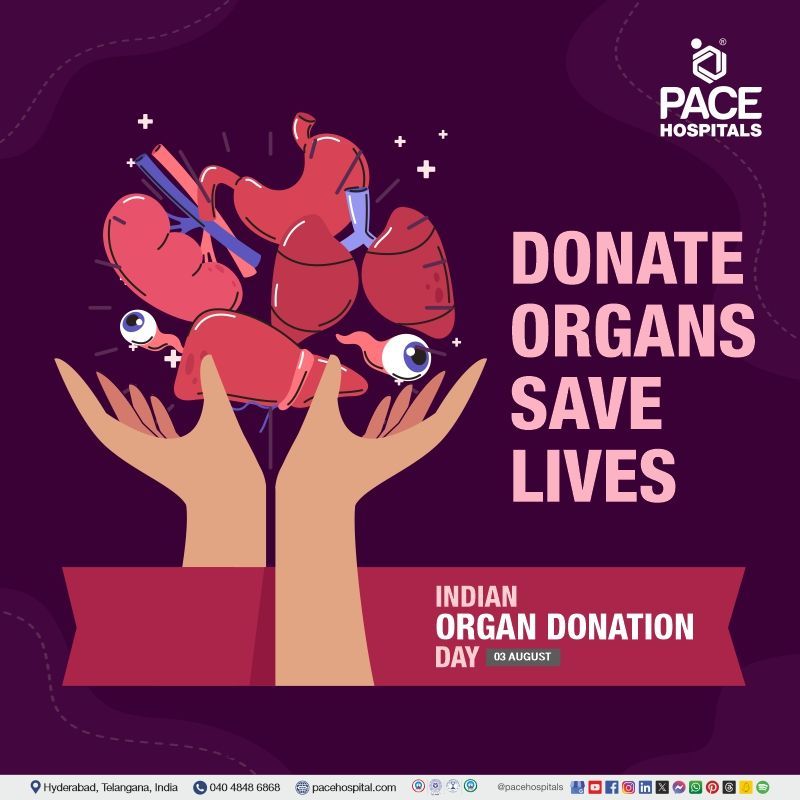
Organ donation process
The organ donation process in India is under the Transplantation of Human Organs & Tissues Act, which is categorised based on two types –
- Living organ donation (donation while the donor is living)
- Organ donation after death (donation of organs after the donor is dead)
Organ donation after death in India (Brain death organ donation)
In deceased donors, the organ donation process is initiated with donor’s optimisation (making the donor's condition ideal for organ donation by stabilising their cardiac output or arterial blood pressure and providing ventilatory support) followed by confirmation of death through neurologic or circulatory criteria followed by the family consent to withdrawal patient’s life support. Organ and tissue procurement procedures will be done rapidly as body inflammatory mediators enter the solid organs, resulting in increased immunogenicity of organs.
The organ procurement coordinator will be informed when a potential donor is near death or has passed away, providing patient-related information that includes the patient's medical history, age, identification number, name, family contact information, cause or expected cause of death and any other information. The organ procurement coordinator will further do the following:
- Schedule more examinations if necessary.
- Check for the patient’s prior consent that they might have given earlier or the presence of their name in the state or central donor registry; if it is not available, the coordinator needs to consult the patient's relatives, such as parents, wife/husband, children, legal guardian etc., to have an authorisation for organ donation.
- The patient will be on artificial life support until the coordinator receives authorisation.
- The coordinator connects the state organ transplant centre to initiate a potential search for matching recipients.
- Based on the tissue type, blood group, height and weight, distance, waiting time, and disease severity, the recipient list will be generated by the state organ transplant centre, and the list will be provided to the coordinator to contact.
- The transplant surgeon takes the final call based on the recipient's health, the tissue's or organ's suitability, and the availability of a local recipient as preferable.
- Similar to organ donation, the receiving (recipient’s) organ coordinator handles consent and matching.
- The donor’s body will be taken to the mortuary, with saline-soaked gauze placed over the eyes, and remains there until the entire harvesting has been done by the surgeons based on standard surgical incisions in a sterile operative platform.
- The heart and lungs are the first preferred procured organs, followed by the liver, pancreas and kidneys as per standard organ removal protocol in the operating room.
- By placing the procured organs into a cooling environment at 4 degrees Celsius, damage by blood flow restriction can be saved to some extent. However, this does not halt all cellular processes. Since organ survival depends on factors that include reduced immune reactivity and oxygen-free radical generation during reperfusion, a comprehensive organ washout process and the selection of optimal preservation solutions are crucial.
- To prevent the organs from freezing during transport, the organs that are removed immediately from the donor's body are stored in a sterile container filled with icy slush.
- The open incisions will be closed surgically.
- The organ procurement coordinator arranges for quick transport to the receipt centre as organs and tissues lose viability very quickly.
Living organ donation
In living donors, the donor can be a close relative of the patient or donate for social welfare (non-relative), where organs can be procured either after their clinical brain death or post-approval from the authorisation committee.
In near relative donors, the donors are majorly genetically related to the recipient and aged above 18 years, such as son, daughter, father, mother, brother, sister, grandfather, grandmother, grandson or granddaughter.
The request for organ transplant would be reviewed thoroughly by the registered medical practitioner and administrative department of the transplant institution, where the authorisation committee will grant the final approval.
The authorisation committee evaluates the following from the near relative donor:
- Results of basic tests and tissue type.
- Documentary evidence of relationship with the recipient such as marriage certificate, birth certificate from sub-divisional magistrate/ metropolitan magistrate or sarpanch of the Panchayat.
- Documentary evidence of identity and the proposed donor's residence, such as passport, driving license, PAN card etc. and a photograph of the family that ensures the relation between the donor and recipient in the presence of another near relative on the same photograph.
If the relationship is not confirmed, further medical tests will be prescribed, such as human leukocyte antigen-A (HLA-A), human leukocyte antigen-B (HLA-B), and human leukocyte antigen-DR (HLA-DR) beta genes using polymerase chain reaction-based DNA methods.
If a genetic relationship does not exist, the above tests should be performed on either both patents (preferred) or at least one parent and other relatives of the donor and recipient (if parents are unavailable) to establish a relationship between the donor and recipient. All the tests should be done from a laboratory accredited by the National Accreditation Board of Laboratories.
The organisation committee shall evaluate the following if the donor is not a near relative.
- No commercial transactions between the recipient and donor.
- No middle person or mediator involvement.
- Consent of the donor that includes a clear statement of why the donor wishes to donate.
- Evidence of relation between donor and recipient.
- The financial status of the donor (income for the last three financial years)
- Free of donor’s criminal record and drug addiction.
Organ donation registration in India
Any Indian who wishes to be a part of the noble cause by donating their organs can follow the below-mentioned procedure:
- Visit National Organ & Tissue Transplant Organisation (NOTTO) website or click here and create a new user by clicking “New User”. Fill out the registration form and submit the form. After submission, the donor will be receiving the donor card after a few days
Registrations for organ donation in Telangana
- Visit government's official website, "Jeevandhan" and Click the red colour icon “click here” on the popup appear or click here for registration. After completing the registration process, the donor will receive a Jeevandhan donor card to their registered email address after a few days.
Importance of organ donation
Organ donation is a noble cause of providing hope for a second life in patients who are suffering from organ failure. The following are the importance of donating an organ.
- Saving the lives of many members, as one cadaver donation can provide life support to 8 members suffering from end-stage organ damage.
- Improving the patient's and their family's quality of life.
- Reducing the overall healthcare cost compared to long-term medical treatments for organ failure.
- Addressing the shortage of organ availability, thereby decreasing waiting times for patients who are in need of it.
Living organ donation pros and cons
The criteria for choosing a living organ donor varies based on the organ to transplant, but in general, the donor should be emotionally and psychologically stable enough to make a selfless donation. However, the living organ donor can have the following pros and cons.
Advantages
- Decrease in organ availability waiting time.
- Lower immune reaction
- Lower rejection rate
Disadvantages
- Risk of post-surgical complications
- Single organ life survival
Difference between Cadaver organ donor and Live organ donor
Both donors can provide a second chance of survival for patients suffering from end-stage organ failure; however, the following are the differences between them.
| Element | Cadaver organ donor | Live organ donor |
|---|---|---|
| Type of organs donate | Can donate 37 organs and tissues in case of brain dead, and bone, blood vessels and skin can be donated in case of cardiac death. | Donate a specific organ such as one kidney, one lung, part of the liver and tissues like bone marrow, skin and blood-forming cells. |
| Procurement | Organs are procured after medically certified death | Organs are procured at the lively condition |
| Surgical Complications | No complications are associated as the donor is deceased | Donors might have few post-surgical complications, and psychological problems post-donation |
| Lab test before transplant | Screening for the presence of infectious diseases by collecting blood samples of the deceased | The live donor undergoes several physical, laboratory and radiological tests. |
FAQs (Frequently asked questions)
Share on
Request an appointment
Fill in the appointment form or call us instantly to book a confirmed appointment with our super specialist at 04048486868

